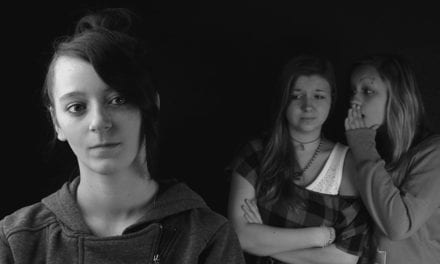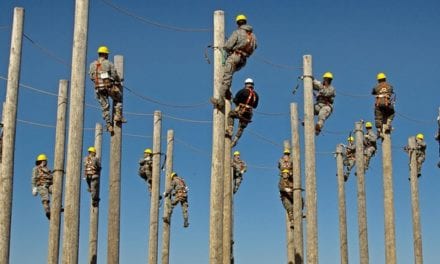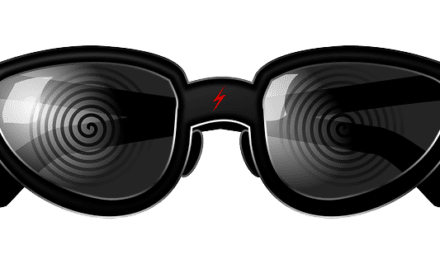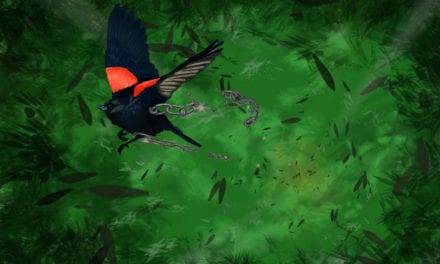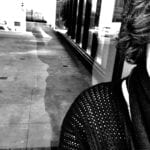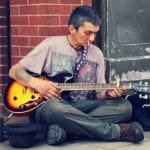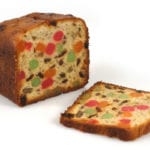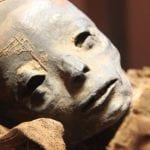I spent the entire afternoon with my favorite aunt on the day before she died. Her name was Etta, but for reasons unknown, her sisters, my mother included, always called her Pan, and we children followed suit. Sometimes, I would call her ‘tante,’ the Yiddish word for aunt, a word imbued with all the love I felt for her.
I am grateful that I got to spend so many hours with her on that last visit, listening to her reminisce about relatives and retell anecdotes, worry about her three adult children and kvell over her seven grandchildren. Her mind traveled back to her own tantes, and to the uncles and cousins and friends who stayed in Europe, and one day just weren’t there anymore. She talked about her father, who died when she was 11, about how hard life was on the Lower East Side, and about her early married life. But she spent the most time lovingly recounting the intelligence and beauty of Prince, her elegant Doberman Pincher, who was her adored pet 40 years ago.
We both knew she was dying and at some point, I asked her if she had lived a happy life. She thought about that for a considerable time before she answered.
“Happy? I wouldn’t say happy. I’ve had an interesting life, and I’ve had moments of happiness. And you know, sweetheart, I think that’s all anyone can hope for – those moments of happiness and not too much boredom.”
Her response has stayed with me. I picture life as a cosmos, darkly streaming all about us, its indifference pointedly reminding us of our profound insignificance, and happiness as a “pale blue dot,” both random and fragile. We barely see it unless we look closely. On her next to last day, my aunt was reminding me to look closely.
For ten years, Greenwich Village was my home. Bleecker Street cuts a diagonal from the Bowery at its easternmost point through the West Village to Abingdon Square where it meets Hudson Street and they both disappear into Eighth Avenue.
Beautiful, expensive brownstones, mid-century apartment buildings, and undistinguished tenements are democratically interspersed among those iconic winding streets. It was there at the western tip of Bleecker that Ward and I lived. We were graduate students making do on the GI bill, two midnight-to-4am taxi-driving stints a week, and part-time clerking at the Strand Bookstore. Our first home together was an extremely small studio at 396 Bleecker.
We were the new kids in the building. Most of the tenants had known each other long enough for complicated relationships to have evolved, some of which were quite intense. Loyalties were fluid and gossip was insidious.
Everyone was united, however, in hating the super. Jorge was a short bull of a man. He complained loudly about the owners who, according to Jorge, paid him a few pennies in salary and required Herculean efforts from him seven days a week. While I aspired to solidarity with the working class, Jorge was a difficult case, especially when I remembered the large, rent-free apartment that was part of his arrangement with the landlord.
Jorge took his revenge on his supposed oppression by performing the few janitorial duties he deigned to do with shameless ineptitude and in a state of spectacular inebriation. Soon after we moved in, I asked him to take a look at our stove, which seemed to be leaking gas, and while he was aimlessly fiddling with the burners, I said something that must have implied he was Puerto Rican. Instantly apoplectic, he pounded his chest fiercely, and with spittle swirling from his lips, he bellowed, “Spanish. No PR. Spanish from Spain. No lousy Spic bastard PR.” So much for working class solidarity. Jorge never pretended to fix another thing in our apartment. In fact, he never entered it again.
We did, however, have constant companions: cockroaches. They were our non-rent paying roommates, and they were everywhere. They strolled in leisurely clusters across our sagging kitchen cabinets, not so much disappearing as dispersing when we tried to kill them. And we really did try – or to be truthful, Ward did. He engaged in one-to-one combat, but their numbers overwhelmed him. He experimented with all manner of bug sprays, but they appeared to be immune. Finally, we arranged to go away for the weekend and he set off bombs that required 48 hours to destroy all living things in reach. Except, as it turned out, cockroaches.
It was after the bombing that we revised our thinking. After all, we told each other, they were here before us. They were the Viet Cong to our Green Berets, the insurgents to our exploiters, the indigenous inhabitants to our capitalist colonialists. Just like the US government, we finally admitted defeat.
One winter we smashed a chair to pieces and fed it to the fireplace for warmth. That same year, the refrigerator broke and we couldn’t find Jorge, let alone hope to get him to fix it, so we kept the milk and butter, which was all we ever had in the fridge, out on the fire escape. I would climb out there, winter or summer, and watch the people who worked coming from or going to the 7th Avenue Subway, the hippie mothers bringing their hippie kids to the park at Abingdon Square, the attendants from Village Nursing wheeling the old people down the block for an outing. Later, the drag queens would gambol down Bleecker on their way to the bars, barely, but not always, eluding the Italian teens waiting for them around every corner between Perry and Christopher. Am I dreaming or is it true that every window on Bleecker Street was open, day and night, providing an unending playlist from hifi’s and radio stations – Dylan, Aretha, Otis, the Stones, the Band, the Beatles, all of them – carried through the streets on the diluted yet identifiable scent of weed? Maybe not, or maybe it was the joint that fueled the fantasy.
Harold and Douglas lived in the apartment directly above us. Harold always wore a three-piece suit and carried an elegant leather briefcase. I never took much notice of Douglas until the night Ward and I went to see Rosencrantz and Guildenstern are Dead. And there he was, on the Broadway stage, playing Alfred the Tragedian, a brilliant actor portraying another one, in an extraordinary play.
The next time I ran into Douglas, I told him how much I admired his performance and the play, and that’s when we changed from neighbors to friends. Harold, we soon learned, lived a double life common to many gay men at that time: he was a conservative, successful, closeted banking executive uptown and a man-loving, bar-hopping, sexual dilettante downtown. In the days when a gay man’s cough wasn’t a death knell, Harold and Douglas had a fairly typical understanding: they could engage in as much sex with as many partners as they liked. Just don’t bring it home.
Harold was the more profligate of the two. He would begin an evening out at midnight, starting with the leather bars on Christopher Street, proceeding to the docks on West Street, and winding up at the trucks on Gansevoort. Ironically, it would be Douglas, the monogamous one, who contracted HIV/AIDS and died after one devastating bout of PCP. Two months later, movers emptied their apartment and Harold disappeared. I never saw him again, but for years, I would run across In Memorium notices in the New York Times obituary section, marking the anniversary of Douglas’ death, and signed with love by Harold. I realized a while ago that I hadn’t seen one in a very long time.
Eve lived directly across the hall. She loved to regale us with stories of her home and family in Arizona, including the scandal of her parents’ “mixed marriage.” Her father was from one of Phoenix’s most socially prominent and dissolute Protestant families; her mother was the daughter of a Jewish tailor who had parlayed a dry goods storefront into Phoenix’s first and largest department store. Eve adored her handsome, fastidious drunk of a father; she was embarrassed by her hardworking, driven mother and by the department store that financed the family’s lavish lifestyle.
She was a dancer. She had the body and grace of a Balanchine muse, but her heart belonged to Martha Graham and after her marriage fell apart, she moved to New York to study with the Graham company. We had actually run across each other at Merce Cunningham’s rehearsal studio in WestBeth, the huge artist’s complex converted from the old Bell Lab building over by the Hudson River, but we didn’t become friends until we found ourselves living across the hall from each other.
When she decided to expose a brick wall in her apartment, I volunteered to help. We went at it with gusto, smashing the plaster as if it were a huge Warholian diptych of Richard Nixon. We reveled in the flaky white façade that crumbled at our feet, creating a milky way of polluting dust particles that, like Nixon, insinuated itself opportunistically into every crack and crevice no matter how small or dark. After a while, we stopped trying to dispose of it and instead, allowed it to self-destruct and dissipate, and one day, like Nixon, it was gone.
My favorite story about Eve was set in Alabama, when she and her then-husband were living at Maxwell Air Force Base. She was an 18-year old bride, who had never been to the deep South. Once a week, she would go into town to do the wash at the local laundromat. She assumed that the washing machines were labeled “colored” and “white” in order to ensure that dyes from a colored wash did not bleed into a white one. She dutifully separated her laundry into the appropriate machines. The proprietor finally enlightened her before she had to be escorted back to the base by the National Guard.
Living la vie boheme wasn’t only sex and drugs and rock ‘n roll, it was also a life that seemed to be lived from one crisis to another in a landscape of sprawling dead men, weeping widows and anguished parents. My father often was the one to call with news and I became very sensitive to the tone of his greeting. When he called me on that night in April, I knew from the moment he said, “Di? Did you hear?” that it was bad. “Hear what?” I asked as I reached for a cigarette. “Martin Luther King. He’s dead. They killed him.” Once my father gave me the bare outlines, we ended the call, both too devastated to talk more. Ward and I didn’t have a television, so we went around the corner to the White Horse and watched the endless replay of the men on the balcony pointing and the man at their feet, dead. The place was packed. No one spoke.
Two months later, it was Ward, shaking me awake at three in the morning. “Something’s happening in L.A.” He’d had the radio on all night, waiting for the primary results from California. “It’s Kennedy. Someone shot Bobby Kennedy. They don’t think he’s gonna make it. Wake up. Di? They killed him. Wake up.”
I didn’t want to wake up. I didn’t want to hear it. I didn’t want to hear it when I got the call from Kings County that Ward’s sister had another psychotic break. We took the IRT, arriving in Brooklyn at 10 o’clock at night, and although she begged Ward to get her out, her eyes were huge, the lenses pinpricks, and she was listening to voices only she could hear. We left without her.
And so it went. In March 1970, the brownstone around the corner blew up and three bomb-making kids died in the basement. One morning in September, I turned on WBAI to find they were playing nonstop Jimi Hendrix. Soon enough I learned why. That October it was nonstop Janis Joplin and a year after Janis it was Jim Morrison. Was that the year Ward’s best friend died in Vietnam and Richard Nixon walked out of the White House a free man? I think so, but the bombardment of deaths and tragedies was coming so fast, it was hard to keep track. Two years later, my father had emergency surgery for a ruptured appendix. The next morning, he died.
On the nights Ward drives the taxi, his shift ends at 4 in the morning and we meet for breakfast at The Pink Teacup. It’s a hole in the wall on Bleecker, south of Seventh, one of the few black-owned and operated businesses in that very Italian part of the Village, and it opens early to accommodate the orderlies and practical nurses getting off the night shift at St. Vincent’s, the fishmongers from Fulton Street, and the taxi drivers, like Ward, who are finishing or about to begin a 12-hour shift.
I hate the grits but love the biscuits; it’s just the opposite for Ward. Often, we are the first ones there and invariably we order huge breakfasts – eggs, scrambled for him, over easy for me, bacon, potatoes, grits and biscuits. Coffee, of course.
We eat slowly and it is extraordinarily good because at this particular moment, there’s nowhere we have to be and no time we have to be there. The sun is coming up over Vito’s bakery, the birds are making a racket, and the Teacup is filling up. The moment is a pale blue dot and I freeze it to remember it always. We head home arm in arm.
Thank you, tante.

